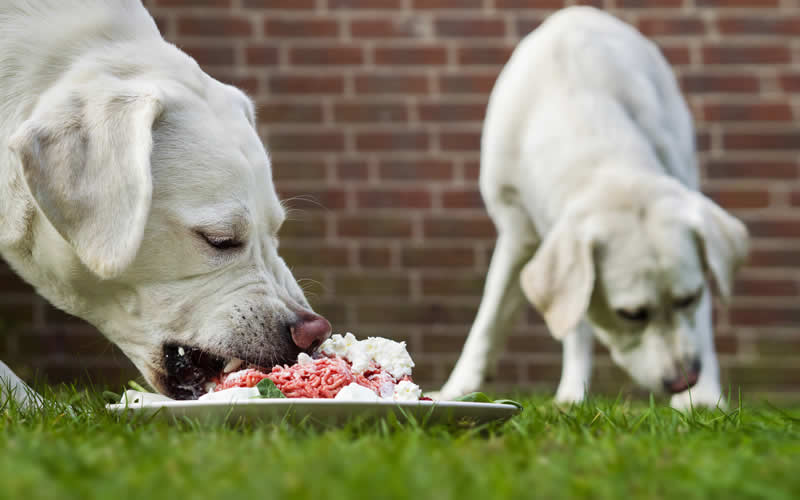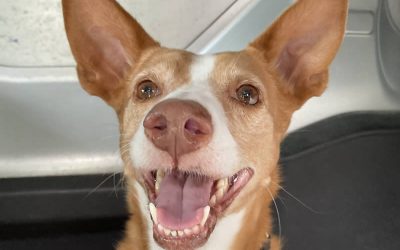Our biggest success we feel is when an owner transitions their dog from raw food to plant-based as there are just so many risks associated with feeding raw food to your dog – risks to both you the owner and your pet.
In July 2021, a news story was published linking raw feeding of dogs to antimicrobial resistance which is particularly shocking as this affects all of us and could very well be the next pandemic we are faced with.
The Science Times reported findings from the European Congress of Clinical Microbiology & Infectious Diseases (ECCMID) as ‘raw dog food contains significant amounts of antibiotic-resistant bacteria, making them a public health risk to Europe and the rest of the world.’
What are the facts:
-
- The investigation was lead by University of Portugal’s researchers.
- The findings have been published in the International Journal of Food Microbiology.
- 46 different dog foods, from 24 brands were analysed for Enterococci. 23 were available in supermarkets and pet shops, 1 from veterinary practices. 22 wet diets, 15 dry and 9 raw-frozen. Brands were international, not only Portuguese.
- The raw diets tested contained duck, turkey, chicken, salmon, lamb, goose, beef, and vegetables.
Antibiotic resistant bugs can render minor injuries and common infections potentially deadly.
Resistance has grown in recent years because of the overuse of such drugs in humans and farm animals.
The bacteria can live harmlessly in human and animal intestines but can be dangerous in other parts of the body and can be resistant to antibiotics.
Researchers found that all of the raw dog food samples contained antibiotic-resistant Enterococci, including bacteria resistant to the last-resort antibiotic linezolid.
Genetic sequencing revealed that some of these antibiotic-resistant bacteria in the raw dog food were the same kind found in hospital patients in the UK, Germany and the Netherlands.
“The close contact of humans with dogs and the commercialisation of the studied brands in different countries poses an international public health risk,” said researcher Ana Freitas.
“European authorities must raise awareness about the potential health risks when feeding raw diets to pets and the manufacture of dog food, including ingredient selection and hygiene practices, must be reviewed.”
In a separate study, which has not yet been submitted to a medical journal for publication, another team from Portugal tested pet owners and animals from 80 households for bacteria with the MCR-1 gene, which provides resistance to the last-resort antibiotic colistin.
All 126 humans were healthy, while half of the 102 pets sampled had either skin or urinary tract infections.
Four humans and eight dogs tested positive for bacteria carrying MCR-1, and in two households the gene was found in both the dog and its owner.
“Genetic analysis of the samples suggested that in one of these two cases, the gene had been transmitted between pet and owner,” he research said, adding that it was thought the gene passed from dog to human.
This raised concerns that pets could spread resistance to last-resort antibiotics.
The WHO classes antibiotic resistance as one of the greatest public health threats facing humanity. Drug-resistant infections kill an estimated 700,000 people a year globally and the UN has warned that could rise to 10 million by 2050 if no action is taken.
-
Summary of the findings:
* 19 samples of dog food out of 46 contained Enterococci.
* All 9 of the raw dog food samples contained multidrug-resistant Enterococci. Genetic sequencing showed some of the resistant bacteria in the raw dog food were identical to bacteria isolated from hospital patients.
* 40% of all samples containing Enterococci were resistant to erythromycin, quinupristin-dalfopristin, streptomycin, tetracycline, gentamicin, ampicillin, ciprofloxacin, or chloramphenicol. All antibiotics we rely upon to treat common bacterial infections.
* 23% of samples containing Enterocci were resistant to linezolid. This included 78% of the raw-frozen diets tested. This is an antibiotic used as a last resort, when bacteria is resistant to more commonly used antibiotics.
* 3 of the 19 non-raw samples contained multidrug-resistant bacteria.
The study concluded:
Raw-frozen foods for dogs carry multi-drug resistant enterococci including last-resort medication for the treatment of human infections (linezolid). The close contact of pets with humans and the commercialisation of the studied brands in different EU countries pose an international Public Health risk if transmission of such strains occurs between dogs and humans.
Dr Freitas, one of the researchers, said “European authorities must raise awareness about the potential health risks when feeding raw diets to pets and the manufacture of dog food, including ingredient selection and hygiene practices, must be reviewed.”
Very sadly raw feeders insist on believing what they want to believe and they ignore the facts.
!! Raw dog food ‘may be fuelling spread of antibiotic-resistant bacteria’ !!


Should All Dogs Go Plant-Based?
Dr Arielle Griffiths is interviewed on live TV Channel 5 and shows Jeremy Vine how delicious vegan dog food is
Beautiful Loki the Vizsla loves Give A Dog A Bean
He’s on Solo Vegetal, as I’ve always been a dry food feeder for convenience, but he goes absolutely nuts for your Give A Dog A Bean!
Oldest living dog Bobi dies aged 31!
How your dog can live as long as Bobi eating a wholefood balanced diet as oldest vegan dog lived until she was 25!
The kindest pet owner you can be
At this noisy time of fireworks, and at anytime, we advise on how to be the kindest pet owner that you can be!
Surrey Vet School Students Are Inspired
Hi Arielle, Thank you so much for coming this evening, it was a fantastic talk! We’d love to have you back to do another talk! Many thanks VetSoc Surrey
The transformation was unbelievable!!
A fascinating discovery by top Vet Oncologist Dr Clare Knottenbelt who put her own dog Jumble on a plant-based diet
Pets At Home Commits To Net Zero Goals
Pets At Home Commits To SustainabilityThis article from October 23 is enormously reassuring in how the big players such as Pets At Home are moving forward - Supporting sustainable pet owners An example of these kinds of environmental commitments can be found at...
Arthur the Diabetic Labrador thrives on his plant-based diet
Just as in humans, the best diet when suffering from diabetes, is a balanced fibre rich, plant-based diet
I’m proud to be the vegan owner of a healthy vegan Cockapoo
We can all be just so proud of what we are doing, and together let’s be the ones to pioneer what Prof Knight has started
I had previously tried him with Yumove tablets and saw no difference!
I recently trialled the Gold Dust along with the Algae oil with a 9 year old 40 kg English Bulldog that I look after who was struggling to lift his back legs to pee and go up and down the stairs
Kissy developed urinary tract problems
She was advised to go onto Royal Canin S/O which is high in wheat and corn gluten, animal fats, hydrolysed animal proteins, crushed shellfish, fish oil, soya oil and dehydrated poultry – nothing kind that suited Kissy!
Prof Andrew Knight’s studies continue!
Prof Knight’s latest study shows the remarkable environmental impact of dogs, cats and us going vegan and how it could quite literally save the planet!












